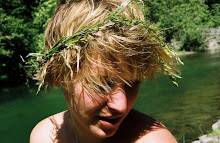
Madam, your eyes are blue...Why?
******************************
******************************
Ajmer:
The duststorm turned to rainstorm and left us (through thunder and lightning) in the shelter of a mechanics/autoparts shop, delighted with the heavy raindrops of the pre-monsoon that were all in such a rush to get out of the sky. It lightens and we try to convince the men in the shop they should come take a look at the huge rainbow that has appeared over the empty road, conveying rainbow through charades. They look at us with tired eyes and don't get up.
The narrow streets are now partly rivers and we wade our way through the brown water on our way to the Dargah Shareef (shrine for the Sufi saint Moinuddin Chishti). Everything looks better with its layer of dust washed off and everybody's full of water smiles, including us. In the dargah complex we are led around by a "priest-man of famous Sufi family - Fukhr". We buy a basket of pink roses and yellow marigolds and try to crowd our way into the shrine. We are Sufi pilgrims again and are all pushed up next to the others on all sides. We cross through the intricately carved and painted archway where a neon glowing Urdu word hangs like a tacky restaurant sign above a beautiful gold crescent moon. Inside the shrine a man on top of the tomb takes our basket, hands us each a handful of flowers and says "now throw the flowers". We join the others in throwing pink and yellow petals into the air and I imagine the massive flower economy all in order to throw flowers over a tomb for a guy who died almost 800 years ago. Pure awesomeness. (We've decided flowers are second after female clothing and accessories in the list of the main goods driving the domestic economy, with chai and mobile recharge coming up behind.) The Flowerman throws a green prayer cloth over our heads without warning, puts one hand on each of our heads and rattles off a minute prayer in what I assume was Urdu, tells us to watch out for our wallets and mobiles, and sends us on our way. We are pleased with our blessing and bump back and forth happily in the small room, where there is more human than space, until we are spit out into another courtyard. We are lucky travellers again and catch the last twenty minutes of a Qawwali performance: one man with a harmonium and around twelve singers. Dotting the periphery of the courtyard people in trances cling to the shrine's wall, wail and shake their head around. Whoa.
We are interviewed: Your country? America. Are you Christian or Muslim? Neither. To which religion you belong? Um. None. Your caste? No caste. Good night uncle.
We go home by cycle rickshaw, the most pleasant form of transport in the cool night air, and one that's come to seem amazingly normal. The streets are filled with electronic music and we ask our rickshaw driver what's going on - he starts dancing while biking, turns around and says party! We saw it start in the afternoon with a parade that had a disturbing number of Hindu gods and teenage boys in sequins for being a political parade: lessons in sectarian politics and Hindu nationalism. We decide there are too many gyrating young men for us to get anywhere near and besides, we've already discovered that Juno is playing on StarMovies.
